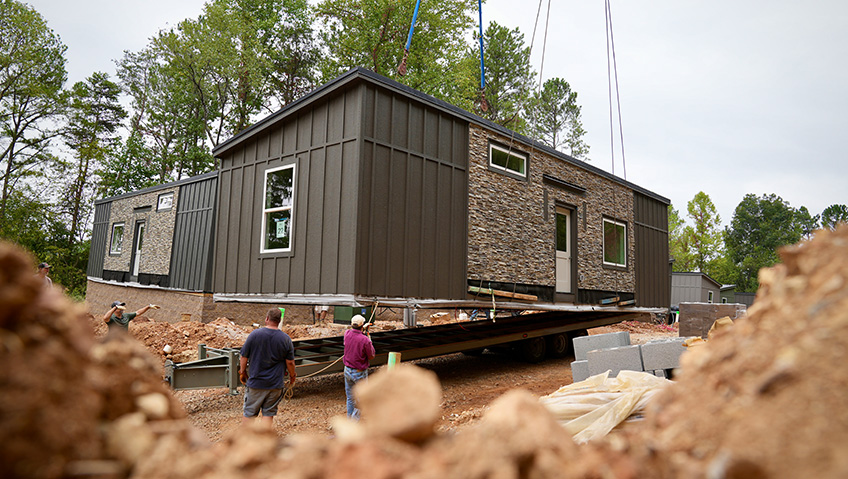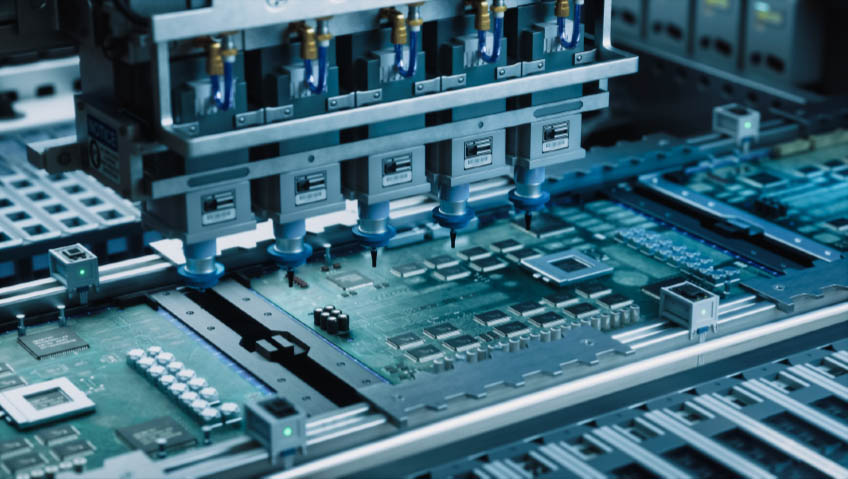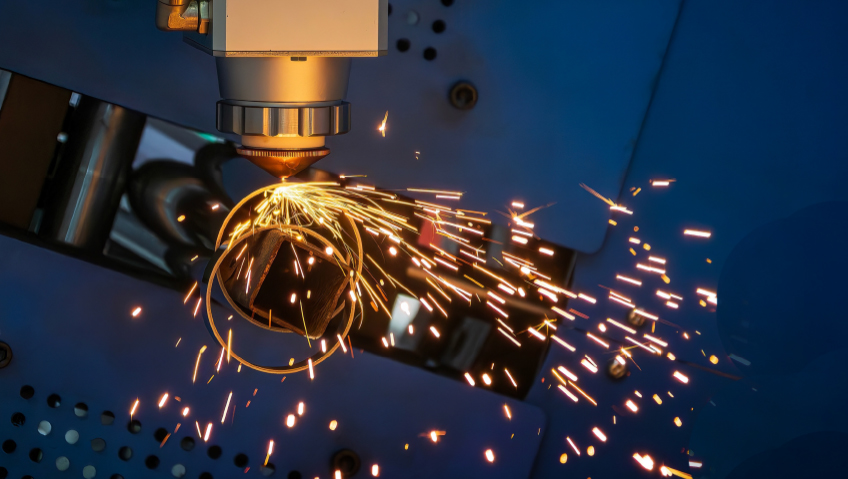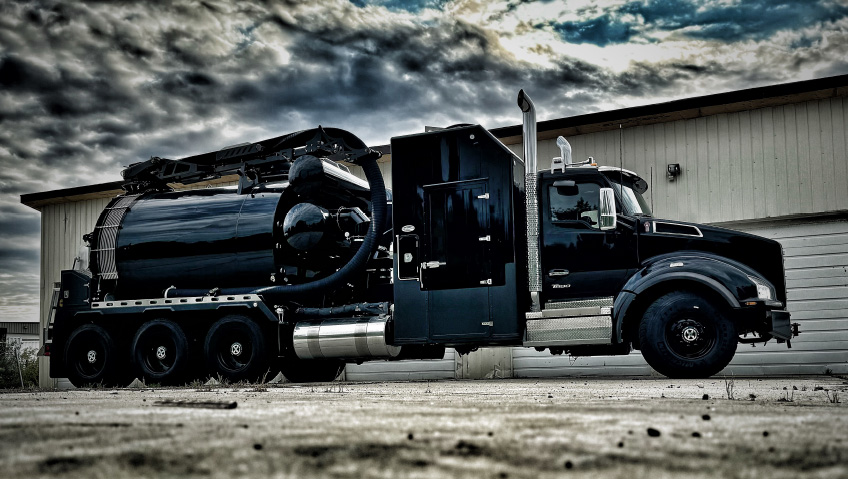Wind River Built is a fast-rising, specialty construction company that custom-manufactures family homes, guest houses, cabins, and other structures. The Chattanooga, Tennessee-based company is eager to expand its market and products while maintaining its unique ‘non-corporate’ culture.
Founded in 2014, Wind River Built used to focus exclusively on tiny homes—that is, small, comparatively inexpensive residences on wheels. The firm was featured on the hit reality show Tiny House Nation and gained a reputation as a premier builder in this sector. In recent years, it has tweaked its business model and expanded into modular construction.
“It was more of a shift in where we think the bulk of our business is going to come from,” explains Director of Business Development, Amelia Dicks. “We will never fully move away from building tiny homes on wheels.”
Modular buildings have foundations and are fashioned from segments built in factories. These segments, or modules, are transported to the building site then fitted together like huge building blocks. Offering a faster, cheaper, and greener alternative to traditional construction processes—in which residences are erected at a building site—modular construction is rapidly gaining in popularity.
Production is carried out at Wind River Built’s 100,000-square-foot plant on 30 acres of land. The company runs a single shift at the moment, built around a shortened week as production crews work 10 hours a day, 4 days a week. Production staff enjoy their three-day weekends, and such a schedule “is part of our culture that everyone seems to enjoy and appreciate,” says Dicks.
The company’s production duties are all self-performed. “We do everything in-house. We have our own cabinet shop, paint booth, spray foam, we do HVAC in-house,” Dicks notes with pride. “We don’t have any subcontractors.” The company does, however, partner with third parties who install its modular buildings. The team works with developers and designers who approach the firm with design concepts that it then brings to fruition, and also offers model designs for modular buildings which can be viewed on the company website.
The factory complies with industry standards from the ICC NTA, an International Code Council organization that certifies modular buildings. When it comes to tiny homes, Wind River Built adheres to American National Standards Institute 119.5 to certify the tiny homes as Park Model RV’s through Pacific West Associates, an engineering firm that provides consultation and quality assurance services for the tiny home niche.
This intense focus on quality is a key element in ‘The Wind River Difference,’ a company ethos that also encompasses excellence and community spirit, says Dicks. That difference is all about “care for both our people and our products,” she says. “It really does translate into everything our clients get from Wind River Built: carefully-crafted products and a customer experience that makes them know they found the right build partner. We’ll welcome anyone to our shop to see and feel this for themselves.”
The Wind River Difference is clearly having an impact; earlier this year, the company won a prestigious Excellence in Innovation Award from the Associated General Contractors (AGC) of East Tennessee.
We last spoke with Wind River Built in November of 2024, and at that time, “We had just released our Hospitality series,” says Dicks. “Hospitality has been a great industry for us, but we also care deeply about building homes for people. So, since our last interview, we’ve released a few signature residential models and have a few more that will be online soon,” she says.
The hospitality sector is still the company’s largest market at present, and designs include the Nova (286 square feet in size with a gable roof, open sleeping area, kitchenette, private bath, and dining area) and the Ronan, which is 390 square feet with floor to ceiling windows and a private sauna. Other hospitality designs include the Rogue (small at 180 square feet, it still offers a porch, coffee bar, and spaces for living and sleeping) and the Wind River Sauna (104 square feet, complete with a private outdoor shower).
For all that, the company’s most popular modular design is a residential model called the Cascade, Dicks tells us. This model home features one bathroom, a pair of bedrooms, and an open floor plan. The house exterior is 43’ long, 25’ wide, and 13’ tall, with 700 square feet of interior space and a base price under $200,000. She attributes the Cascade’s popularity to the fact that “it’s hard to find single family homes at that footprint size… built with traditional construction anymore.”
Given its diminutive footprint, the Cascade could also fit into the emerging accessory dwelling unit (ADU) category, she adds. Sometimes called ‘granny flats,’ these units are secondary residences located on the property of an existing home. They are often small and, as their nickname implies, frequently house older relatives who want to live independently but remain close to their families, or young adults preparing to launch. ADUs can also be used as guest houses for short-term visitors.
While Wind River Built is eager to explore opportunities in the ADU market, permitting and extensive paperwork can make it a challenge to get such units installed. Obtaining pre-approval for building plans from municipalities would be one way to speed this process along, Dicks says. The company is also looking to expand its presence in the student and workforce housing sector as well as the single- and multi-family residential sector.
Regardless of the sector involved, almost all of the firm’s projects are based in the Southeast, Tennessee in particular. That said, “We are actively pursuing development projects across the country and have been approached with some bid requests for the Caribbean and other islands,” Dicks shares.
The company currently has 110 employees and in terms of new hires, “We look to find people that fit with our culture, that want to grow with us. We look for people with integrity… that want to do good work and be part of something that’s meaningful and fulfilling for them.” Led by an accessible, open-minded team, the company is “not corporate,” she says. “Everyone gets a voice.”
Non-corporate as it may be, Wind River Built is starting to land some big contracts. One project mentioned when we last spoke, to build 75 cabins for a resort in the Great Smoky Mountains, has since been completed. The cabins are done, pending installation.
To keep growing, the company attends trade shows, is active on social media, and engages in old-fashioned networking, the latter involving “finding people we want to work with and reaching out to them.” Wind River Built also hosts events at its own facility and takes on in-house projects that showcase its talents and the benefits of modular construction. At the time of our interview, the team was in the process of having a Cascade model modular home installed in Signal Mountain, a town near Chattanooga. VIPs and “people who may be modular-skeptic—who haven’t seen a modular home before” have been invited to view the residence, says Dicks.
Another project involves the installation of a Cascade home on a parcel of land donated by the Chattanooga Land Bank Authority, an affordable housing organization. This partnership is one of Wind River Built’s latest charitable endeavors. The firm has also worked with North Carolina-based nonprofit group, Patriot Relief, to build homes for victims of Hurricane Helene. The team assists with classes that raise awareness about the trades, supports the United Way, and regularly picks up litter as part of an Adopt-a-Highway effort as well.
The company also maintains an internal ‘Helping Hand Fund’ that is used to assist “our Wind River Built family as well as community members,” says Dicks, and has a committee that brainstorms team-building exercises that often involve a philanthropic component.
Going forward, the company may build another facility on its property. It also aims to cement relationships with designers and architects as it takes on larger assignments.
“A lot of developers will go to their existing professional team, which might include [architects and designers], asking about modular, and then those architects and designers are tasked with finding manufacturers,” Dicks explains. “So, we’ve been putting more effort into expanding those relationships and we encourage people to reach out to us if there’s interest in doing developments with modular construction.”
Wind River Built is also determined to educate politicians and the public about the benefits of modular construction. While becoming more commonplace, many people still mistakenly associate modular with lower-quality trailer homes. “We have to talk to municipalities, talk to the community, help them understand that these are real residential homes, and they’re of a high quality,” notes Dicks.






